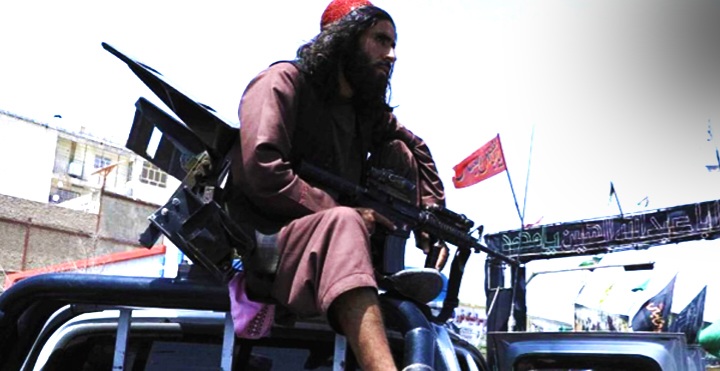Alwaght- With the advent of Muharram mourning ceremonies, conflicting news come from Afghanistan about the conditions of the Shiites and their mourning ceremonies for Imam Hussein, the grandson of Prophet Muhammad.
The Council of Shiite Scholars (CSS) of Afghanistan in a statement called on the Taliban authorities not to ban religious flags and signs and Ashura commemorative ceremonies. The council released a statement in its “emergency meeting” that was arranged with the presence of tens of religious scholars in Kabul, where participating leaders called for Taliban lifting all kinds of ban on the Ashura events.
The meeting, held on Saturday and attended by the head and members of the council, the head of Supreme Council of Imamiyah Scholars, prayer imams, and authorities of mosques and mourning stations across Kabul, called on the Taliban to remove the restrictions and also take part in these religious activities.
Also, a number of scholars expressed deep regret about violent dealing with mourners by the Taliban security forces and taking down mourning signs and flags installed by the Shiites in some neighborhoods of the capital.
“According to the wishes of the mourners, all the Shiite scholars ask the Islamic Emirate to remove the restrictions on the Muharram mourning ceremonies and also not to ban, anywhere, the installation of mourning flags that are raised as a sign of mourning in the name of Imam Hussain,” the closing statement read.
In the meeting, the arrangers put to display petitions signed by people in mosques over the past few days demanding lifting of the restrictions. The petition also contained a demand from the Taliban to provide security of the ceremonies.
Ayatollah Salehi Modaress, the head of CSS, said that given the recent restrictions on the Shiite religious activities, “we agreed to hand over a copy of the meeting resolution to the Taliban authorities for actions.” He added that the people demand lifting all of the restrictions on Muharram events.
Seyyed Hussein Alami Balkhi, the deputy head of the CSS, thanked the Taliban for last year's security provision in Muharram, adding that people expect the current rulers to do more to provide security and that he hopes them to join the mourning ceremonies.
Security of mourning stations fully provided
For their part, the Taliban claimed that the full security of the Shiite ceremonies was provided. On Sunday, news outlets reported that Kabul governor along with the capital’s security authorities visited a number of mourning stations and mosques hosting ceremonies in Kabul and assured them about full security provision.
“The security of Muharram days is 100 percent guaranteed, and for this reason, no security incidents have occurred in the past few days and will not occur in the future,” a statement published by the governor’s office said.
The aim of the visit was said to evaluate the security arrangements, receive proposals, and settle the problems the mourners face.
Earlier, Mulawi Abdulsalam Hanafi, the second deputy acting prime minister of the Taliban government in a meeting with the Kabul governor called for security provision during Muharram. Praising the services provided by the governor to the residents of the capital, Hanafi held that the security in Kabul is excellent thanks to the sacrifices of the security forces.
“The security forces should do their best to secure the mosques and mourning stations,” he further said.
Also, Sheikh Mohammad Qasim Khalid, the governor of Kabul, said that security forces have managed to bring security and peace to the citizens of the capital with round-the-clock efforts, and the city and suburbs of Kabul are enjoying complete security.
Last week, Mulawi Abdulkabir, the acting prime minister, called for “close cooperation” of the Shiites with the government as Muharram drew closer. The prime minister’s office, citing Abdulkabir, stated that in a meeting with Shiite leaders and scholars from various provinces he stressed that Shiites are “an important part” of Afghanistan and their rights are secured in the light of the Sharia.
“Shiites, like other Afghans, are an important part of the country, and everyone is given equal and fair rights in the light of Sharia law,” he was quoted as telling the Shiite officials.
Reports of restrictions on the Shiites
Whereas the Taliban government says no limitations were imposed on Muharram ceremonies, there have been multiple reports proving otherwise. Some Afghan news sources have reported that the Taliban authorities have banned the installation of flags related to Imam Hussein and the month of Muharram in Shiite neighborhoods and public roads. In this connection, Shiite sources reported that the Taliban authorities ordered the Shiite citizens to refrain from raising religious flags, beating their chests in the streets, mourning in the cities, and installing flags on the doors of houses and shops.
Shafaghna news website reported that the Taliban this year, contrary to the past two years, have imposed limits on the Ashura mournings and half of the mosques and Husseiniyahs were ordered not to hold commemorative ceremonies.
Local sources in Kabul reported that the Taliban in the majorly-Shiite neighborhood of western Kabul “detained and hit” a county representative for installing mourning signs in the market of his area of duty. Local sources in Daykundi in central Afghanistan have confirmed that the Taliban forces removed mourning signs and flags of Imam Hussein from the province’s markets. In Mazar Sharif in north of the country, the Taliban authorities banned a mourning ceremony organized by a number of shopkeepers.
However, they allowed a number of vendors selling flags, headbands, and mourning cloths to set up their stands in Pul-e-Sukhta and and Golayee Dawakhana neighborhoods of Kabul.
Additionally, in the first day of Muharram, the police presence in the Shiite areas was reported heavy. A number of sources said that these forces were deployed to enforce the restrictions. Last year, the Taliban removed tenth of Muharram holiday, the day of martyrdom of Imam Hussain, from national calender and this year began to impose restrictions.



























